Exploratory Evaluation of Speech Content Masking
Conference: Speech Communication - 15th ITG Conference
09/20/2023 - 09/22/2023 at Aachen
doi:10.30420/456164042
Proceedings: ITG-Fb. 312: Speech Communication
Pages: 5Language: englishTyp: PDF
Authors:
Williams, Jennifer (Electronics and Computer Science, University of Southampton, UK)
Pizzi, Karla (Fraunhofer AISEC, Garching, Germany; 3 Technical University Munich, Germany & Laboratoire Informatique d’Avignon (LIA), University of Avignon, France)
Noe, Paul-Gauthier (Laboratoire Informatique d’Avignon (LIA), University of Avignon, France)
Das, Sneha (Dept. of Applied Mathematics and Computer Science, Technical University of Denmark, Denmark)
Abstract:
Most recent speech privacy efforts have focused on anonymizing acoustic speaker attributes but there has not been as much research into protecting information from speech content. We introduce a toy problem that explores an emerging type of privacy called “content masking” which conceals selected words and phrases in speech. In our efforts to define this problem space, we evaluate an introductory baseline masking technique based on modifying sequences of discrete phone representations (phone codes) produced from a pre-trained vector-quantized variational autoencoder (VQ-VAE) and re-synthesized using WaveRNN. We investigate three different masking locations and three types of masking strategies: noise substitution, word deletion, and phone sequence reversal. Our work attempts to characterize how masking affects two downstream tasks: automatic speech recognition (ASR) and automatic speaker verification (ASV). We observe how the different masks types and locations impact these downstream tasks and discuss how these issues may influence privacy goals.


